Part 1: November 2 Broadcast

You are listening to BBC radio 4. In an hour, we will be presenting a half hour long documentary on the phenomenon of the aurora borealis featuring professor Hodgkin of the University of Montreal. For the next hour, Professor David Stephenson will be presenting a documentary on the second 80 years war of the eighteenth century. This series will be running every third day, up to 50 episodes. Next week, we will be presenting a special on Johan Sebastian Bach. If you want news of the current war in the Middle East please channel in to BBC radio 1.
It is May 29, 1720. Dutch forces from across Western Europe have amassed by the thousands along the English Channel. The English spy masters know of the oncoming storm and have pulled in thousands of Irish and Scottish conscripts. Shipwrights work around the clock on both sides of the channel trying to insure dominance at sea. A dark pall hangs over a broken Europe, and soon, the fate of Britain will soon be decided.
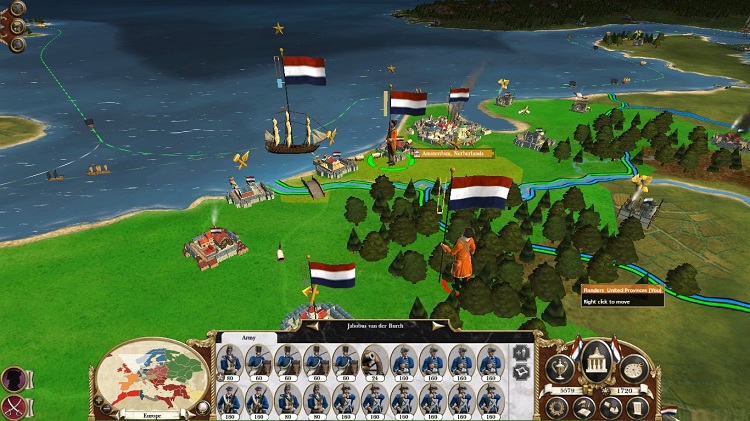
The Dutch massing near Rotterdam Harbour.
In India, the V.O.C. from their stronghold in Mysore march forth to conquer the Indian subcontinent. The confident Maratha confederacy, swelled with the pride of defeating their Mughal opressors have their armies unaware and scattered. Outnumbering the V.O.C. in India near ten to one, they were unprepared to face a fully modern European style army.
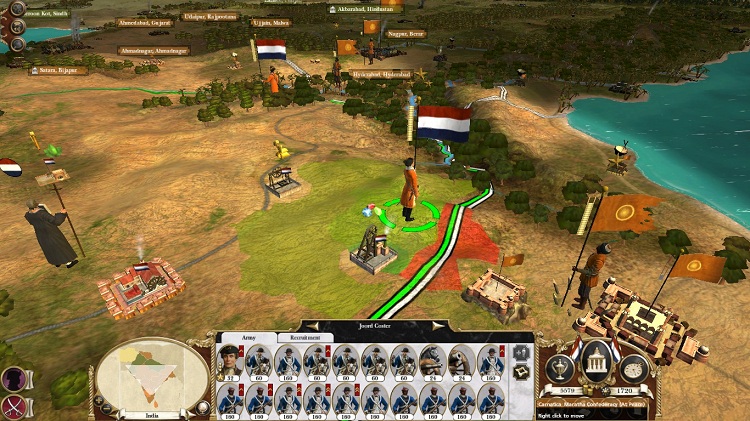
Dutch moving out to invade India.
While the war over the tiny British Isles, alone and far from mainland Europe would seem an issue of the channel, India far from the concerns of Europe and the old regimes, these battles would spark a war that would rage across four continents and last generations. This is the second 80 years war.
Good evening, and welcome to BBC radio 4. I’m Professor David Stephenson, professor of Dutch historical studies at Cambridge. This is the first part of our 50 episode special on the second 80 years war over Europe. Joining me for these broadcasts are fellow researchers and scholars Doctor Albert Andrews, specialist in German studies from the Berlin academy, Professor Robert Lowe, specialist in French studies at Cambridge, and a graduate student and technical assistant, Anton Thatcher. I personally will be presenting the history of the Dutch, the English and the scenes among them.
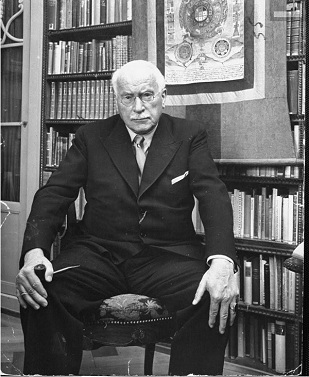
I’m Albert Andrews, I will be discussing and presenting any events from Eastern Europe, including Russia, the Italian states and the Ottoman Empire.
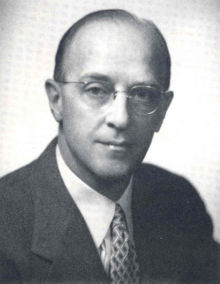
I’m Robert Lowe, I will present information about the people and colonies of France, Spain and the Americas.


Anton Thatcher, who does not have any spoken lines in this broadcast.
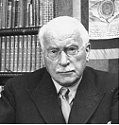 At the turn of the century, the United Provinces had become the world’s wealthiest and most influential trade nation. The V.O.C., or the Dutch East Indian Trading Company has more control, and more wealth than many nations. Funding their burgeoning trade fleets in the Philippines, and their armies in Ceylon, the V.O.C. is capable of bringing home the equivalent of hundreds of millions of dollars every year. While limited in real power, the Dutch Statdholder, William the third of Orange rules the thrones of Scotland and England. The Dutch colonies in the Americas, fuelled by slavery, are some of the most profitable in the world, and by the winter of 1701, the Dutch Navies had cleared out piracy along their trade routes around Madagascar and were poised to hurl them out of their hideouts in the Americas. For a nation that had broken from their Hapsburg oppressors a mere 120 years prior, the future looked bright indeed.
At the turn of the century, the United Provinces had become the world’s wealthiest and most influential trade nation. The V.O.C., or the Dutch East Indian Trading Company has more control, and more wealth than many nations. Funding their burgeoning trade fleets in the Philippines, and their armies in Ceylon, the V.O.C. is capable of bringing home the equivalent of hundreds of millions of dollars every year. While limited in real power, the Dutch Statdholder, William the third of Orange rules the thrones of Scotland and England. The Dutch colonies in the Americas, fuelled by slavery, are some of the most profitable in the world, and by the winter of 1701, the Dutch Navies had cleared out piracy along their trade routes around Madagascar and were poised to hurl them out of their hideouts in the Americas. For a nation that had broken from their Hapsburg oppressors a mere 120 years prior, the future looked bright indeed.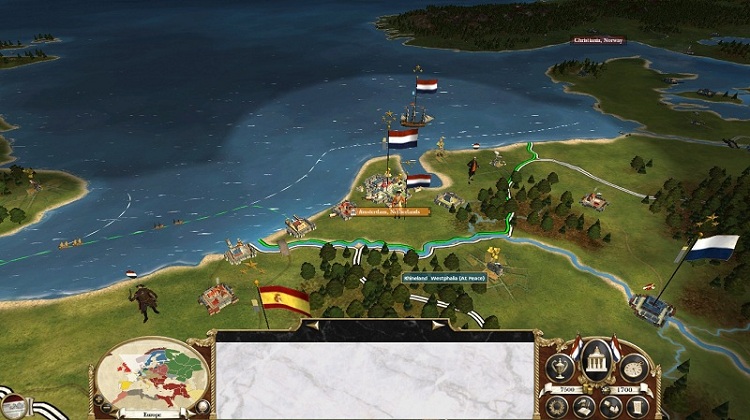
Amsterdam circa 1700.
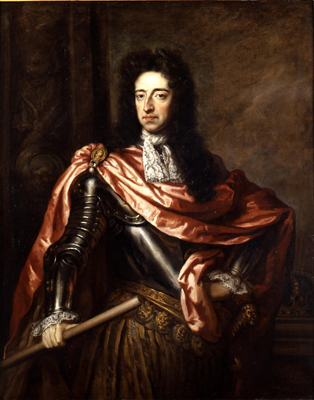
William III of Orange
 But beneath the splendour and opulence of the Amsterdam stock exchange, their trade guilds and their prestigious naval academies, the cabinet of the United Provinces are plotting in their back rooms, well away from the public eyes. The Ministers of the United Provinces had planned on declaring war on France, taking their capitol of Paris immediately. With France and their great wealth of resources, farmlands and territory in their pocket, the Dutch sought to acquire the land mass and population required to challenge and defeat the Spanish. However, the Dutch were in a predicament. While the French and Spanish united were too powerful for the small Dutch republic, the French and Spanish were individually also too great for the Dutch to handle. They needed a distraction to draw away the great continental army of France away from the Dutch, and to find justification for declaring war upon the French without inciting war against the Spanish held Flanders.
But beneath the splendour and opulence of the Amsterdam stock exchange, their trade guilds and their prestigious naval academies, the cabinet of the United Provinces are plotting in their back rooms, well away from the public eyes. The Ministers of the United Provinces had planned on declaring war on France, taking their capitol of Paris immediately. With France and their great wealth of resources, farmlands and territory in their pocket, the Dutch sought to acquire the land mass and population required to challenge and defeat the Spanish. However, the Dutch were in a predicament. While the French and Spanish united were too powerful for the small Dutch republic, the French and Spanish were individually also too great for the Dutch to handle. They needed a distraction to draw away the great continental army of France away from the Dutch, and to find justification for declaring war upon the French without inciting war against the Spanish held Flanders.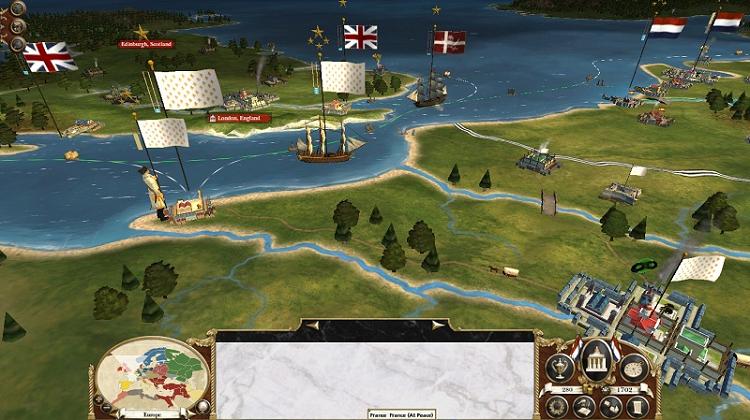
France was Vastly better armed than the United Provinces.
 To this end, the United Provinces turned to a spy from the lowlands. Willem Ganesvoort was a Flemish spy on the Hapsburg payroll, one they had hired to spy on the rebellious republic. Secretly however, Ganesvoort was a double agent. No one is certain to this day if Ganesvoort was loyal to the republican cause, or if he was merely bought off for an even greater sum of money. Either way, he had an inordinate knowledge of the Spanish and French political scene, and an ever increasing and dramatic role over the war in Europe.
To this end, the United Provinces turned to a spy from the lowlands. Willem Ganesvoort was a Flemish spy on the Hapsburg payroll, one they had hired to spy on the rebellious republic. Secretly however, Ganesvoort was a double agent. No one is certain to this day if Ganesvoort was loyal to the republican cause, or if he was merely bought off for an even greater sum of money. Either way, he had an inordinate knowledge of the Spanish and French political scene, and an ever increasing and dramatic role over the war in Europe.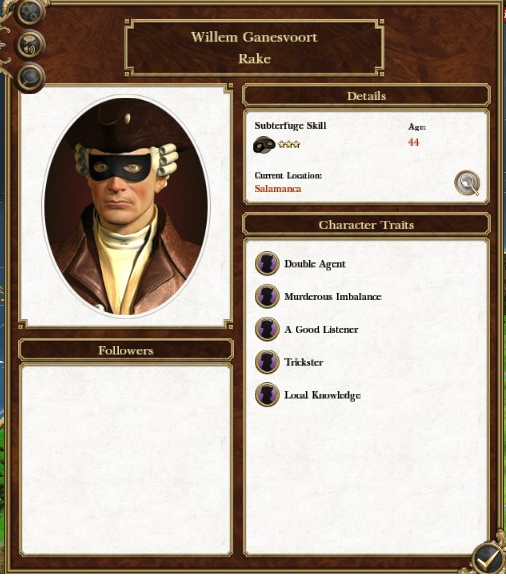
William Ganesvoort by 1715
 Not much is known about the personal life or history of Willem Ganesvoort, but it is known that while acting as a spy for the Spanish, he was also acting as an agent provocateur for the Dutch. Working with the Spanish government and the French as well by 1701, he “discovered” a number of secret Parliamentary radicals. Generals, scholars, even prominent clergymen were put to the executioners axe at the dark whispering of Willem. Perhaps too eager, he would become famous for a string of assassinations dealt with perhaps too great an enthusiasm for the task later in his life, though it is often thought that he himself had never directly killed a man.
Not much is known about the personal life or history of Willem Ganesvoort, but it is known that while acting as a spy for the Spanish, he was also acting as an agent provocateur for the Dutch. Working with the Spanish government and the French as well by 1701, he “discovered” a number of secret Parliamentary radicals. Generals, scholars, even prominent clergymen were put to the executioners axe at the dark whispering of Willem. Perhaps too eager, he would become famous for a string of assassinations dealt with perhaps too great an enthusiasm for the task later in his life, though it is often thought that he himself had never directly killed a man.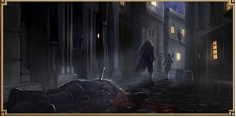
One of Ganesvoort's victims.
 While Ganesvoort worked hard in the shadows, the Dutch head representative and grand pensioner Jos Grave was busy in the limelight. He was accumulating trade agreements and alliances in the North of Europe among Hannover and Westphalia, and diplomatically insuring the continued friendship of the British. Comparatively inept, he was unable to insure Spanish neutrality, nor draw in any of the major Eastern powers, such as Austria or Prussia, both whom were antagonized by the inability of Grave to commit to either side of their conflict. Because of this, the Dutch government was forced to prepare to fight largely alone, save for Westphalia and against the Spanish as well as the French. Shortly after, Jos Grave was fired from office and replaced by the young and ambitious Geralt Roemer. While Roemer was vastly more competent, he was unable to win over the other nations, many of whom disliked the British and her allies by proxy, and whom had already established precedence while dealing with Grave.
While Ganesvoort worked hard in the shadows, the Dutch head representative and grand pensioner Jos Grave was busy in the limelight. He was accumulating trade agreements and alliances in the North of Europe among Hannover and Westphalia, and diplomatically insuring the continued friendship of the British. Comparatively inept, he was unable to insure Spanish neutrality, nor draw in any of the major Eastern powers, such as Austria or Prussia, both whom were antagonized by the inability of Grave to commit to either side of their conflict. Because of this, the Dutch government was forced to prepare to fight largely alone, save for Westphalia and against the Spanish as well as the French. Shortly after, Jos Grave was fired from office and replaced by the young and ambitious Geralt Roemer. While Roemer was vastly more competent, he was unable to win over the other nations, many of whom disliked the British and her allies by proxy, and whom had already established precedence while dealing with Grave.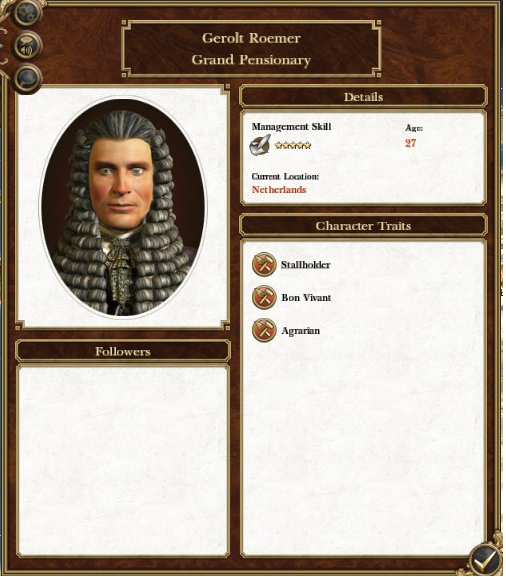
Geralt Roemer was made Grand Pensionary following the incompetence of Jos Grave.
 While the British government officials were repeatedly denying that these men were agents of the English, or that the Anglo-Dutch alliance was meant to counter the Franco-Spanish alliance, William the third was able to influence enough of the English nobility to add credibility to otherwise spurious claims. The conspiracy was a success. By the winter of 1702, the French declared war on Great Britain, embarking upon a fleet in the channel, leaving Paris open for conquest. In 1703, French agents had retrieved enough counter intelligence to implicate the Dutch as the creators of the conspiracy, and were quick to declare war on the Dutch alliance of England (whom they were already at war with) Westphalia, Hannover and the United Provinces.
While the British government officials were repeatedly denying that these men were agents of the English, or that the Anglo-Dutch alliance was meant to counter the Franco-Spanish alliance, William the third was able to influence enough of the English nobility to add credibility to otherwise spurious claims. The conspiracy was a success. By the winter of 1702, the French declared war on Great Britain, embarking upon a fleet in the channel, leaving Paris open for conquest. In 1703, French agents had retrieved enough counter intelligence to implicate the Dutch as the creators of the conspiracy, and were quick to declare war on the Dutch alliance of England (whom they were already at war with) Westphalia, Hannover and the United Provinces. 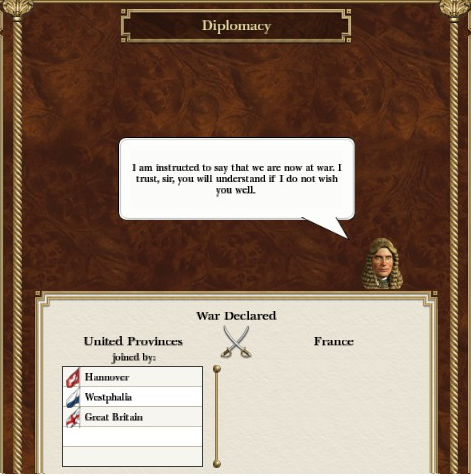
War is declared, France stands alone against the Dutch, English and Germans.
 Marching south to knock out the weaker Dutch ally, and to protect their eastern stronghold of Alsace Lorraine the French left the way open for the Dutch to take Paris. Meanwhile, the Spanish, slow to react had still not pledged aid to the French, nor provided assistance of any sort. Confusion took hold of the French forces as they moved chaotically across the landscape. The only way it could have gone smoother, is if the French forces had already crossed the channel.
Marching south to knock out the weaker Dutch ally, and to protect their eastern stronghold of Alsace Lorraine the French left the way open for the Dutch to take Paris. Meanwhile, the Spanish, slow to react had still not pledged aid to the French, nor provided assistance of any sort. Confusion took hold of the French forces as they moved chaotically across the landscape. The only way it could have gone smoother, is if the French forces had already crossed the channel.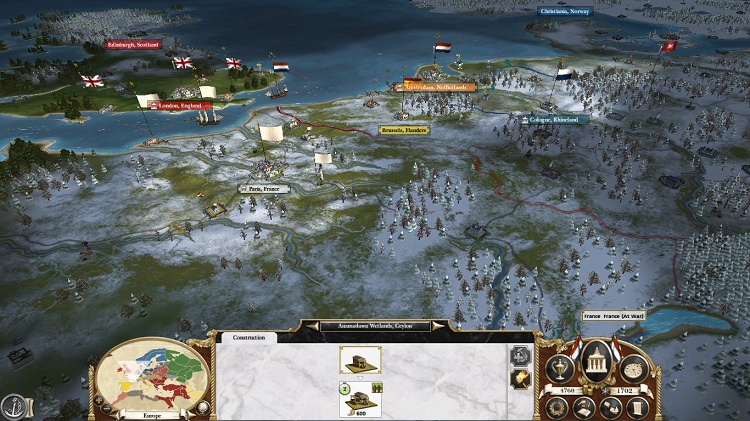
French forces are spread through France.
 The Dutch were not entirely ready for this war. They had not expected their ruse to be so successful, so quickly. What’s worse, the ministers refused to allocate precious funds into arming more conscripts with the populace thinking that the United Provinces were at peace. As such, the republican militia at Amsterdam departed immediately, being the only army they had available, while the minister of defense rushed to fill the gap by calling up a tremendous conscription call across their Empire, this time receiving the support and funding for a professional armed force. However, this army would not be completed for another 3 years.
The Dutch were not entirely ready for this war. They had not expected their ruse to be so successful, so quickly. What’s worse, the ministers refused to allocate precious funds into arming more conscripts with the populace thinking that the United Provinces were at peace. As such, the republican militia at Amsterdam departed immediately, being the only army they had available, while the minister of defense rushed to fill the gap by calling up a tremendous conscription call across their Empire, this time receiving the support and funding for a professional armed force. However, this army would not be completed for another 3 years.
The Dutch army was extremely outdated in the early 1700s.
 This was a move that could very easily backfire. Teetering on the brink of their own destruction, the Amsterdam militia set sail for France. William of Orange commented as he oversaw their departure at Rotterdam that “Daring and brilliance won us this chance. They’ll also win us this war.”
This was a move that could very easily backfire. Teetering on the brink of their own destruction, the Amsterdam militia set sail for France. William of Orange commented as he oversaw their departure at Rotterdam that “Daring and brilliance won us this chance. They’ll also win us this war.”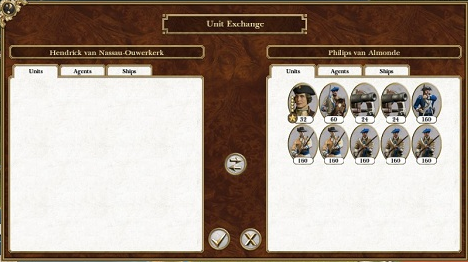
The regimental tally departing from Rotterdam in the Dutch fleet.
 During these years, the Dutch army was largely press ganged into existence by the wealthy elite. Those who were not of a noble title were required to either serve in the army as an officer, to fund and raise a militia garrison, or to press gang a conscripted army force or they would lose their ability to vote. Nobles similarly were required to be patrons to the army, paying for weapons, uniforms etc. As such, at this time, the Dutch army was of extremely variable quality, and their professional soldiery was relegated to essentially a single guard regiment, as well as overseas marines. Ouwerkerk was of the view that Dutch national pride would adequately motivate his troops, while the younger general Waaldeck had preferred the idea of a more professional, yet expensive modern army.
During these years, the Dutch army was largely press ganged into existence by the wealthy elite. Those who were not of a noble title were required to either serve in the army as an officer, to fund and raise a militia garrison, or to press gang a conscripted army force or they would lose their ability to vote. Nobles similarly were required to be patrons to the army, paying for weapons, uniforms etc. As such, at this time, the Dutch army was of extremely variable quality, and their professional soldiery was relegated to essentially a single guard regiment, as well as overseas marines. Ouwerkerk was of the view that Dutch national pride would adequately motivate his troops, while the younger general Waaldeck had preferred the idea of a more professional, yet expensive modern army.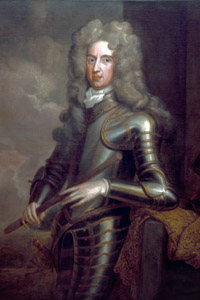
Ouwerkerk preferred the old model of Dutch army.
 The tactics used by generals such as Ouwerkerk were similarly medieval. Pike formations would provide close in support while gun armed troops would fire in mass volleys before wheeling behind their pike armed protection. If the enemy guns deviated from their line of pikes, the cavalry would rush forward to rout them quickly, often causing the entire enemy formation to panic and flee. Cannons, firing solid shot at a great distance, were used to disrupt tight formations, perhaps opening up an opportunity for a cavalry charge, but the round shot was not itself ideal for causing casualties.
The tactics used by generals such as Ouwerkerk were similarly medieval. Pike formations would provide close in support while gun armed troops would fire in mass volleys before wheeling behind their pike armed protection. If the enemy guns deviated from their line of pikes, the cavalry would rush forward to rout them quickly, often causing the entire enemy formation to panic and flee. Cannons, firing solid shot at a great distance, were used to disrupt tight formations, perhaps opening up an opportunity for a cavalry charge, but the round shot was not itself ideal for causing casualties. More contemporary forces had begun to discard the pike, as well as frontal cavalry charges in favour of well trained line infantry. A wall of fire from modern muskets was vastly different from the slow firing less reliable firelock weapons traditionally used, and if well organized, could gun down considerable amounts of cavalry before they could even close the gap between them, meaning the pike was needed only to defend the flanks, and by 1705, many nations could safely discard them completely, replacing them with the bayonet. Meanwhile, cavalry was marginalized from their former position of dominance, now moved almost exclusively to making flanking actions, pursuing routed enemies, or spiking artillery. No longer was the heavy cavalry the deciding arm of the military.
More contemporary forces had begun to discard the pike, as well as frontal cavalry charges in favour of well trained line infantry. A wall of fire from modern muskets was vastly different from the slow firing less reliable firelock weapons traditionally used, and if well organized, could gun down considerable amounts of cavalry before they could even close the gap between them, meaning the pike was needed only to defend the flanks, and by 1705, many nations could safely discard them completely, replacing them with the bayonet. Meanwhile, cavalry was marginalized from their former position of dominance, now moved almost exclusively to making flanking actions, pursuing routed enemies, or spiking artillery. No longer was the heavy cavalry the deciding arm of the military. Despite their ancient and inadequate army and method of fighting on the continent of Europe, the Dutch weren’t completely caught unawares. The savage Americas had a powerful force of ships, colonial marines, native auxiliaries and militia prepared to take over the French held colonies in Guyana and the Windward Isles. Particularly, the Dutch colonial marines, veterans of the battle for the Leeward Islands against largely former British pirates would be an overwhelming force against the French colonies and plantations. The Dutch Americas fleet, having cleared the pirates from those islands and capturing their ships of the line from them, had total domination of the sea lanes, letting the Dutch move with impunity amongst the scattered French strongholds.
Despite their ancient and inadequate army and method of fighting on the continent of Europe, the Dutch weren’t completely caught unawares. The savage Americas had a powerful force of ships, colonial marines, native auxiliaries and militia prepared to take over the French held colonies in Guyana and the Windward Isles. Particularly, the Dutch colonial marines, veterans of the battle for the Leeward Islands against largely former British pirates would be an overwhelming force against the French colonies and plantations. The Dutch Americas fleet, having cleared the pirates from those islands and capturing their ships of the line from them, had total domination of the sea lanes, letting the Dutch move with impunity amongst the scattered French strongholds.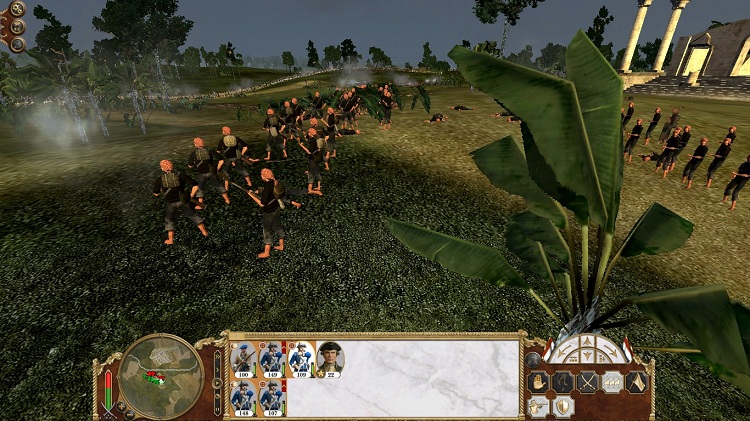
Dutch expelled the pirates from the Americas by 1705, but invaded the Leeward isles in 1701.
 These men were ferried throughout the Americas by Admiral Callenburgh who was patrolling the American coast for pirates had caught several galleons, both Spanish and piratical in nature over the course of his career. Starting of very humble origins, Gerard Callenburgh had worked his way up from the cadet son of a wood carpenter, all the way to Vice Admiral and Admiral of the American fleet. Though he was of low standing before his enlistment in the navy, he had managed to attract the friendship and patronage of William III, which likely assisted in his promotion. Having served as an officer of various stations and in many theatres, Callenburgh was a competent commander, and many galleons and brigs were captured by the small Dutch American fleet, be they pirate or Spanish.
These men were ferried throughout the Americas by Admiral Callenburgh who was patrolling the American coast for pirates had caught several galleons, both Spanish and piratical in nature over the course of his career. Starting of very humble origins, Gerard Callenburgh had worked his way up from the cadet son of a wood carpenter, all the way to Vice Admiral and Admiral of the American fleet. Though he was of low standing before his enlistment in the navy, he had managed to attract the friendship and patronage of William III, which likely assisted in his promotion. Having served as an officer of various stations and in many theatres, Callenburgh was a competent commander, and many galleons and brigs were captured by the small Dutch American fleet, be they pirate or Spanish.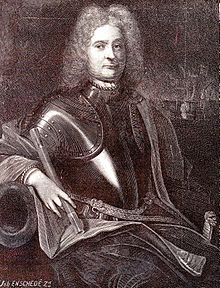
Lord Callenburgh
 Prior to his posting in the Americas, Callenburgh, like many Dutch naval officers of the time, was notably present at the battle of Beachy Head against the French. Inconsistently holding positions in theatres of war, his specialty lay in defending shipping and policing trade lanes.
Prior to his posting in the Americas, Callenburgh, like many Dutch naval officers of the time, was notably present at the battle of Beachy Head against the French. Inconsistently holding positions in theatres of war, his specialty lay in defending shipping and policing trade lanes.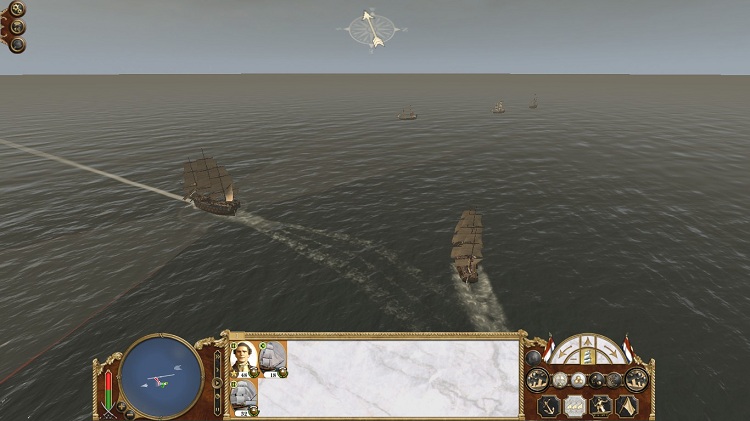
Callenburgh fending off pirates in the Americas.
 Taking these important ports and plantations would provide millions of guilders every year, and provide a powerful base of operations to challenge the New Spain and Louisiana colonies of the Americas. Abroad, the Dutch domination at sea and the trading ports the world over meant they were able to call up an entire army at a moment’s notice, while the ailing French trade meant they could only raise what the taxes of their citizens would pay. A fleet of trade ships had been sent to Madagascar with the duel purposes of furthering that advantage, and in routing the pirates who had preyed on the Dutch shipping from the Americas. Defeating them and securing the ivory trade, the Dutch had an alarming monetary advantage over their French adversaries. It would be needed. If the Dutch were to take Paris, the cost in policing the massive nation would be nearly insurmountable.
Taking these important ports and plantations would provide millions of guilders every year, and provide a powerful base of operations to challenge the New Spain and Louisiana colonies of the Americas. Abroad, the Dutch domination at sea and the trading ports the world over meant they were able to call up an entire army at a moment’s notice, while the ailing French trade meant they could only raise what the taxes of their citizens would pay. A fleet of trade ships had been sent to Madagascar with the duel purposes of furthering that advantage, and in routing the pirates who had preyed on the Dutch shipping from the Americas. Defeating them and securing the ivory trade, the Dutch had an alarming monetary advantage over their French adversaries. It would be needed. If the Dutch were to take Paris, the cost in policing the massive nation would be nearly insurmountable.Next broadcast, we’ll be looking into the Battle of the Eastern Channel and the Battle of Paris, a decisive raid that would alter the state of the world over forevermore.
This has been the first look into the second 80 years war, presented by David Stephenson. Next, we have Professor Hodgkin discussing the Aurora Borealis from the arctic North of Canada. In half an hour, we will be presenting world news. If you want news of the current war in the Middle East please channel in to BBC radio 1.